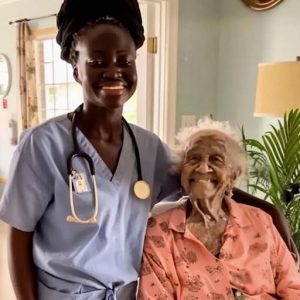The nursing home smelled faintly of lemon cleaner and medicine—sterile, yet oddly comforting to you, more real than any foster home you once drifted through. You had come initially as a volunteer, a short‑term plan to bolster your university application while you scraped by with odd jobs. Your guidance counselor warned that staying too long would make leaving harder, but three years later—now at twenty‑five—you’ve never left. The halls, dinners, bingo nights—this place, you realized, became your home.
Then everything shifted. On one ordinary afternoon, while doing your rounds, you passed Mrs. Coleman’s door. She reached out, gripped your hand with surprising strength, and whispered, “I know you.” Thinking she confused you with someone else, you gently reminded her you were Vaughn, the long‑term volunteer. But she insisted: “You used to live next door … you were a little girl … you’d come to my birthday every year … I never forgot those eyes.” In that moment, hazy childhood memories—candles, laughter, cake—pressed at the edge of your mind. She remembered you when you thought you were invisible.
That night, your world turned again. You woke to a bank alert: $700,000 deposited into your account. Then a call: Mrs. Coleman had been rushed to the hospital, now in a coma. You were handed an envelope, in shaky pen: “Use this for your dreams, sweet girl. You deserve it.” Before you could process, she slipped away. She left you not only money, but belief—in yourself.
You didn’t pursue a standard path. You gave back. You donated $50,000 to the home she loved, improving living conditions for others. You gave the rest to foster‑care charities. You kept just enough to enroll in nursing school, planning to return—not as volunteer, but as nurse. Standing outside Mrs. Coleman’s room one last time with sunlight on her empty bed, you realized she gave you more than money: she gave you direction, purpose, and the reminder that someone had always seen you.




